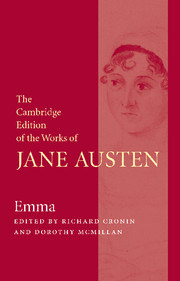Chapter 10
Published online by Cambridge University Press: 18 December 2020
Summary
THE appearance of the little sitting-room as they entered, was tranquillity itself; Mrs. Bates, deprived of her usual employment, slumbering on one side of the fire, Frank Churchill, at a table near her, most deedily occupied about her spectacles, and Jane Fairfax, standing with her back to them, intent on her pianoforté.
Busy as he was, however, the young man was yet able to shew a most happy countenance on seeing Emma again.
“This is a pleasure,” said he, in rather a low voice, “coming at least ten minutes earlier than I had calculated. You find me trying to be useful; tell me if you think I shall succeed.”
“What!” said Mrs. Weston, “have not you finished it yet? you would not earn a very good livelihood as a working-silversmith at this rate.”
“I have not been working uninterruptedly,” he replied, “I have been assisting Miss Fairfax in trying to make her instrument stand steadily, it was not quite firm; an unevenness in the floor, I believe. You see we have been wedging one leg with paper. This was very kind of you to be persuaded to come. I was almost afraid you would be hurrying home.”
He contrived that she should be seated by him; and was sufficiently employed in looking out the best baked apple for her, and trying to make her help or advise him in his work, till Jane Fairfax was quite ready to sit down to the pianoforté again. That she was not immediately ready, Emma did suspect to arise from the state of her nerves; she had not yet possessed the instrument long enough to touch it without emotion; she must reason herself into the power of performance; and Emma could not but pity such feelings, whatever their origin, and could not but resolve never to expose them to her neighbour again.
At last Jane began, and though the first bars were feebly given, the powers of the instrument were gradually done full justice to. Mrs. Weston had been delighted before, and was delighted again; Emma joined her in all her praise; and the pianoforté, with every proper discrimination, was pronounced to be altogether of the highest promise.
- Type
- Chapter
- Information
- Emma , pp. 259 - 265Publisher: Cambridge University PressPrint publication year: 2005

